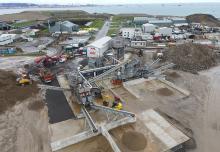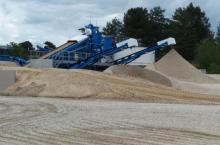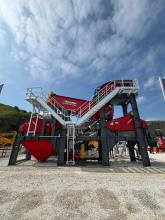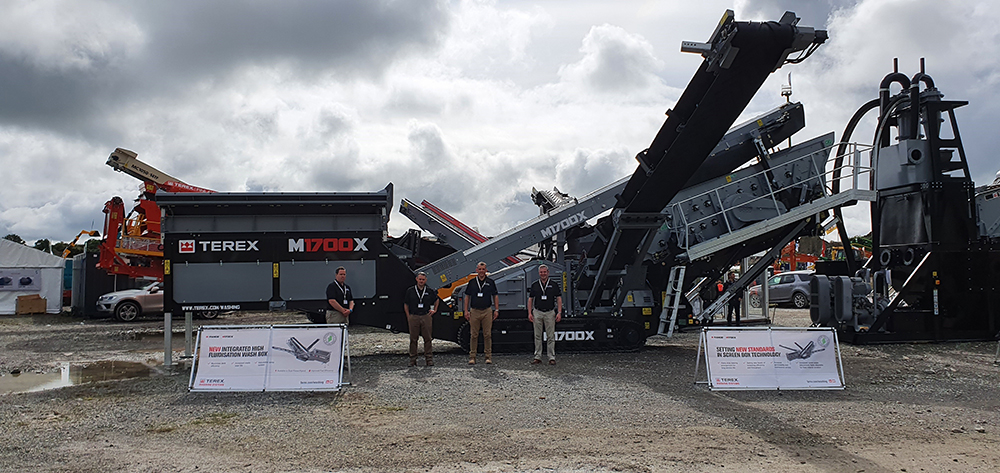
Terex Washing Systems (TWS) launched its innovative washing solution — the M1700X mobile washing screen — at the recent CQMS exhibition, Ireland’s construction and quarry machinery show.
The M1700X is a redesign of the M1700 and improves the M Range of mobile washing screens manufactured by TWS that can produce up to five products (three aggregates and two sands) in applications including aggregates, recycling, industrial sands, and mining. The M1700X was featured alongside the FM120 C-2G, which allows sand to be recovered when both machines are connected.
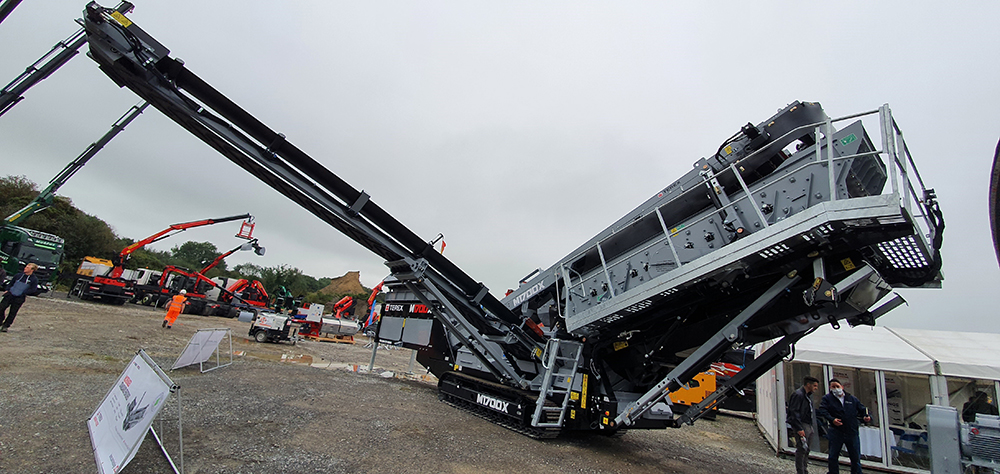
Barry McMenamin, TWS business line director, said: “The addition of the M1700X will enhance an already significant product range offered by Terex Washing Systems, meeting both market and customers’ needs for mobile washing. Our team of engineers have worked closely with our customers to develop improvements to an already high-performing machine, such as the new tracked rinser that features a redesigned high fluidisation wash box, increased standard features and improved washing efficiency.”
The new integrated high fluidisation wash box maximises deck efficiency, increases media wear life and has an adjustable spray system. It also boasts increased standard features, including a standard hydraulic raise-and-lower function for quicker service access, standard hydraulic tensioning, and one-piece catchbox for easy machine reconfiguration.
Setting new standards in screen box technology, the M1700X has a heavy-duty bearing arrangement for long service life, higher levels of screening efficiency and throughput, increased serviceability and maintenance access as well as increased screen-angle adjustment that is highly adaptable for feed material variation.
The model has also been redesigned with a focus on wet processing efficiency, with a 16% increase in spray capacity across all decks, industry-leading levels of catchbox sealing, innovative configurable catchbox outlets and configurable blending to maintain material specification.
Additionally, the M1700X is easily transported, has a quick set-up time (typically 15 minutes), and has optional hybrid power available around the world.
Speaking about the 2021 edition of the CQMS show held 10-11 September in Tullamore, Co. Offaly, McMenamin continued: “It was terrific to be back at a show, welcome customers to our stand and showcase the capability of our equipment and discuss our latest innovations. We were delighted by how well the M1700X was received and we look forward to building on the connections made at CQMS and discussing how our bespoke solutions can meet their specific needs.”
Reykjavík, Iceland-headquartered concrete producer Steypustöðin – Námur has announced a significant new investment in an upgrade to its CDE wet processing plant that will see it almost double its sand- and aggregate-processing capacity in Hólabrú, Hvalfjarðarsveit.
An area noted for the quality of its natural materials, excavation has been undertaken at Hólabrú for several decades, supplying high-grade sand and aggregate products to meet the material needs for asphalting, road construction and civil engineering in the Icelandic capital.
In 2009, it was estimated that up to 1,000,000m³ of material had been excavated and processed by Tak-Malbik and Vélaleiga Halldórs Sigurðssonar to support major public works and infrastructure projects, with up to a further 2,000,000m³ to be processed by the end of this decade.
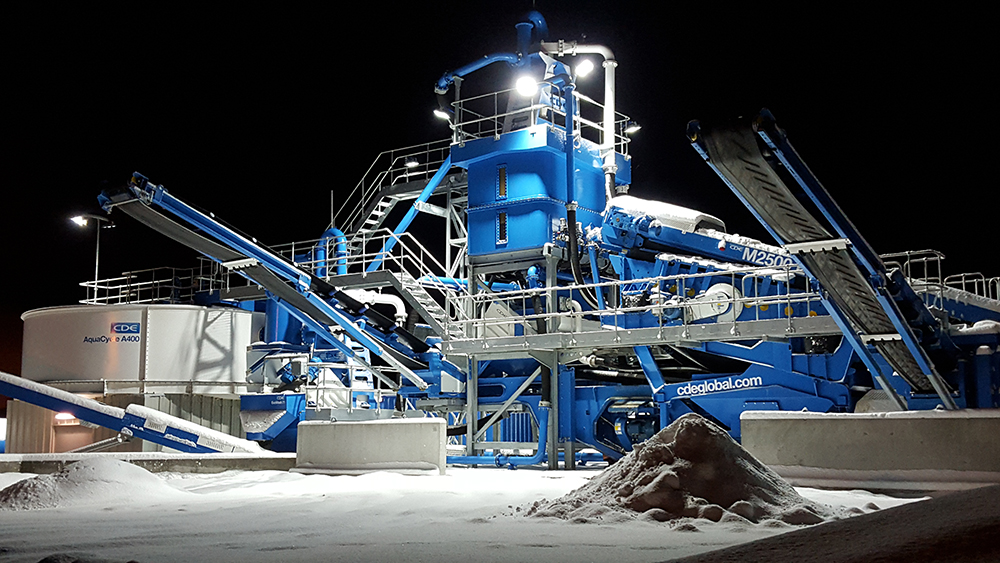
In 2018, Steypustöðin acquired two businesses, Alexander Ólafsson and Tak-Malbik, and with it, two state-of-the-art CDE wet processing solutions commissioned for the companies in October of that same year.
They were integrated into Steypustöðin’s operations, reinforcing the company’s material-processing capabilities through the acquisition and integration of industry experts, heavy machinery and material-processing plants, including Tak-Malbik’s 80 tonnes per hour (tph) CDE sand and aggregate wash plant.
These resources are supporting the continued development of Steypustöðin’s mines – Vatnskarðsnáman and Hólabrúarnáman – which remain vital suppliers of minerals for projects in the capital area, other local municipalities and Vegagerðin, Iceland’s road administration.
Due to increasing demand for its product range, Steypustöðin is now investing in an upgrade to its CDE plant that will increase the processing capacity from 80tph to 150tph.
Hörður Pétursson, chief operating officer at Steypustöðin – Námur, says despite 18-hour production shifts demand continues to outstrip supply.
“Our site operates from 7am to 11pm six days per week, but in spite of a busy production schedule we‘re still experiencing demand greater than that which we can supply, impacting our ability to build up reserves. The existing CDE plant coupled with our experience of working with its expert team has underscored much of the success of this site to date. For this reason, we were keen to work with the team again to devise a solution that would help us to increase our production volumes.”
Allan Esmann, CDE’s business development manager for Denmark, Iceland and Greenland, says identifying the bottleneck limiting the plant capacity was key.
“When it was first installed, the jet pump was capable of conveying sufficient sand and gravel relative to the demand at the time and it was a solution that satisfied the material needs of both the customer and the market. However, with increasing demand for premium construction materials its limited capacity is impacting Steypustöðin’s ability to meet the call of the construction industry or build up its own material reserves.”
The original configuration of the plant split 0-8mm materials into two fractions – 0-4mm and 4-8mm – on the bottom deck of the M2500, a fully integrated modular washing plant that combines feeding, screening, sand washing and stockpiling into one compact and mobile chassis.
The jet pump, utilised for the 4-8mm fraction, was identified as the bottleneck, limiting the feed material throughput, Esmann explains.
“We proposed an upgrade that will see the removal of the jet pump which is to be replaced by a new traditional pump. In addition, the full bottom deck will be utilised for one fraction (0-8mm) which will be pumped to a new, separate dewatering screen.
“Here, the 4-8mm fraction will be dewatered, screened off, and stockpiled via a new conveyor system, while the 0-4mm underflow of the screen will be pumped back into the original configuration where it will be dewatered and minus 63 micron material removed through a new, higher capacity cyclone.”
When commissioned, the upgrade will almost double sand and gravel production for Steypustöðin, whose product range includes five outputs: +22mm oversize, 8-22mm, 4-8mm, 0-4mm and 0-8mm.
Esmann says the project is a demonstration of CDE’s customer-for-life approach.
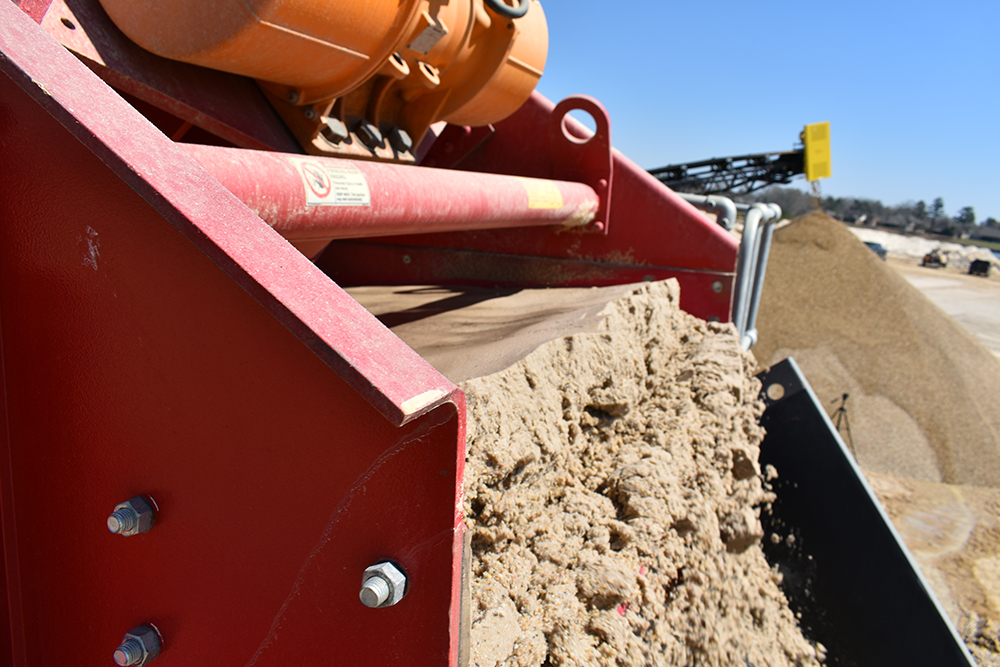
“Our durable technologies are backed up by leading aftersales support, delivered by the CDE CustomCare team. We operate a customer-for-life model that sees us continue to work closely with customers once a plant has been commissioned, ensuring maximum uptime and throughput to meet our performance guarantees. We have developed an excellent working relationship with the team at Steypustöðin and we’re pleased our technology continues to support one of the leading producers of concrete in Reykjavík.”
Commenting on the durability of CDE wet processing solutions, he adds: “CDE technology is robust and adaptable, meaning that we were able to devise a solution that will completely transform the operation and output of Steypustöðin’s plant while retaining its core infrastructure and original configuration.”
Pétursson commends the drive and determination displayed by the CDE team in engineering a solution to increase Steypustöðin’s production in line with soaring demand.
“We’re hugely impressed by the flexibility of the CDE plant and the ability of its expert team to integrate these new components into the operation. Rather than a full plant overhaul, these relatively low-cost upgrades, when commissioned, will have a transformational impact on our production and accelerate return on investment.”
With a long history of designing, manufacturing and installing modular washing equipment, McLanahan’s line of UltraWASH modular wash plants is said by the American company to be its latest solution for customers needing a configurable line, backed by decades of service and support. Engineered to include all McLanahan equipment that helps producers meet their process requirements, McLanahan modular wash plants provide the reliability, simplicity and efficiency that producers need from their wash plant.
All equipment that is part of the UltraWASH plants, including the vibratory screen, hydrocyclones, dewatering screen, and sump and pump, is based on McLanahan’s well-known, field-proven designs. UltraWASH plants provide a quick, easy-to-install processing system. These modular wash systems are said to be ideal for producers facing criteria such as planning permits, multiple locations, short-term deployment, and/or an unknown/variable feed stock (e.g. construction and demolition (C&D) waste-streams applications) that make implementing a customised, fixed processing solution difficult.
Currently available in nine sizes and configurations, the UltraWASH can produce up to three aggregate products and up to two sand products. There is a single-process water-feed point, as well as a single effluent discharge point.
McLanahan currently offers several additional configurations and add-ons to the UltraWASH, including:
- Single or dual sand product
- Feed preparation (log washer, blade mill, coarse material screw)
- Attritioning module for specialty sand production
- Organics removal module
- Water treatment with the EcoCYCLE thickener
- EcoPRESS filter press for complete wastewater treatment
With the greater separation efficiency of hydrocyclones/separators, the UltraSAND is proven to provide a higher product yield compared to stand-alone processing equipment. Producers can achieve a much lower moisture content from the dewatering screen, depending on the characteristics of the sand.
Capable of removing water soluble materials from the toughest of clays, McLanahan UltraSCRUB modular plants provide a flexible washing option for aggregate feeds. Arriving on-site in containerized modules, producers will benefit from the shorter lead times, quick set-up and ease of transport offered by the UltraSCRUB.
UltraFINES modular fines recovery plants are a combination of a sump, pump, hydrocyclones and a dewatering screen in a module that is specifically designed to recover fines from a wash plant effluent stream. The recovered material is conveyable and stackable, and is suitable for multiple industries, including sand, iron ore, coal recovery, ash, industrial sands, frac sand and more. UltraFINES modular plants recover fines to produce a standalone product and reduce the amount of solids reporting to the settling pond or downstream equipment.
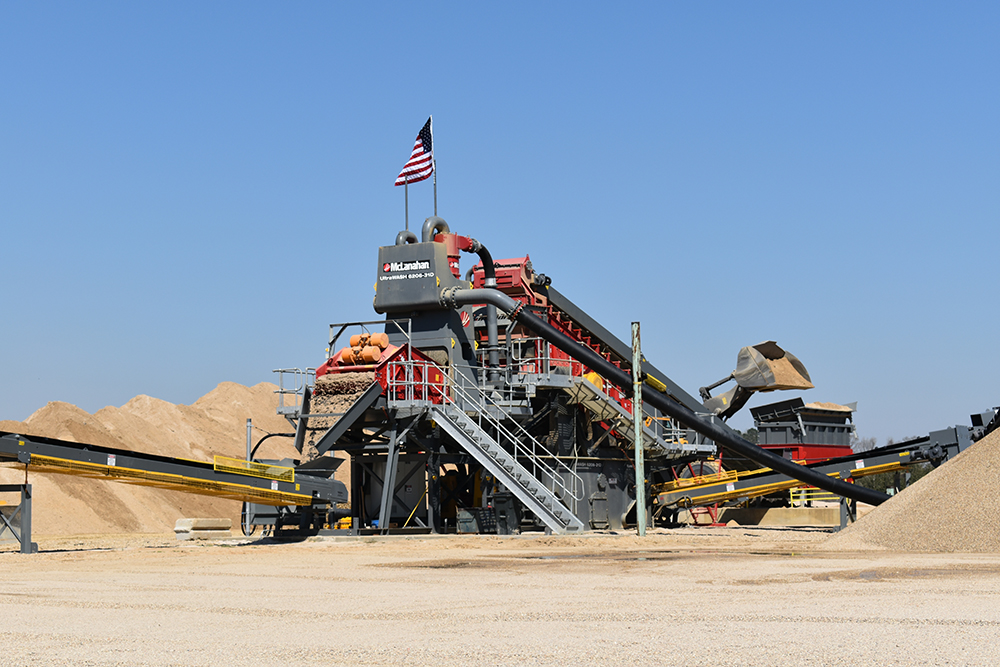
The UltraDRY modular dewatering screen has a quick set-up that can be easily added onto any new or exisiting equipment. The slow travel speeds of material through the dewatering screen allow for longer sand retention, which generates better drying time for a consistently dry product.
McLanahan’s dewatering screens use the highest G-force on the market, which enables them to handle the largest loads. An optional pump add-on can provide ideal water placement for a cleaner product, while limiting water usage.
EcoPRESS filter presses provide the ability to optimize tailings management with the recovery of clean, reusable water. The EcoPRESS can address many typical issues associated with fines processing, including full slurry ponds/tailings dams, high material-handling-equipment repair costs, limited expansion capabilities, environmental permit restrictions, high waste-material handling costs and limited water availability.
EcoCYCLE thickeners provide a compact and modular solution for water recycling and sludge handling. EcoCYCLE plants come complete with motor, pump, floc dosing station, control panel and control cabin.
A variety of modular plant solutions can be used to meet production requirements, resulting in a reduction in site work, cost and time in production. These systems are also likely to be stocked by local dealers to get you into quick production.

